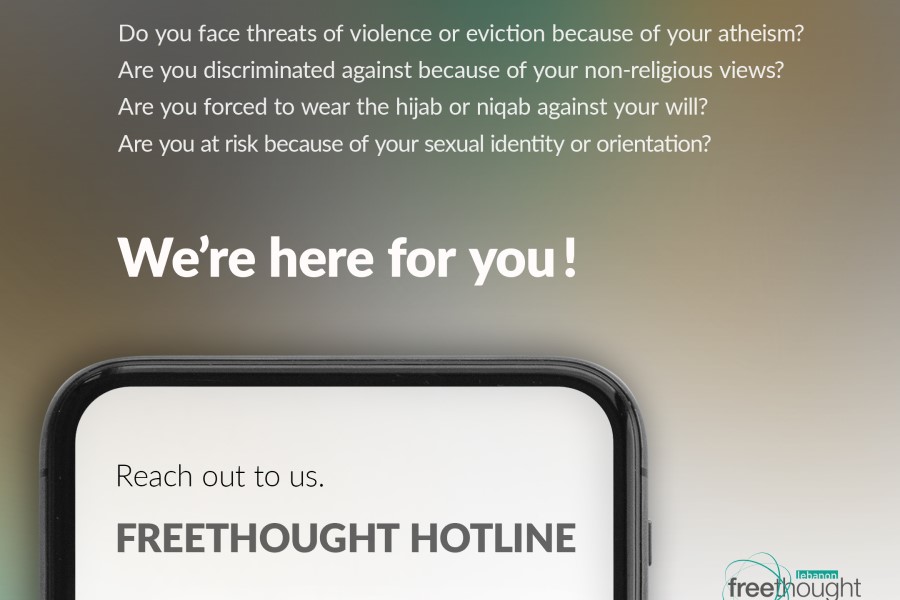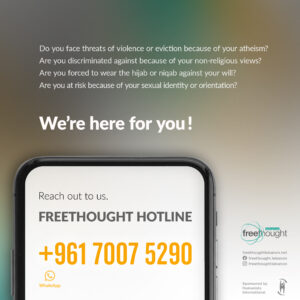
We have the tools to influence change, now we must use them
Part three: providing solidarity & advice

Part three: providing solidarity & advice

Nercese Armani, the coordinator of Freethought Lebanon’s hotline
In June 2021, having worked informally to support humanists at risk for a number of years, Freethought Lebanon – an Associate Member of Humanists International – established its Freethought Hotline dedicated to supporting non-religious individuals in Lebanon and neighboring countries.
In a country where the non-religious face severe discrimination, having such a hotline is a lifeline for many; providing a safe environment for them to express their concerns with a trained case worker who is able to assess their level and type of risk, and determine the best course of action.
Since starting it, Freethought Lebanon has supported 47 people at risk with counseling, signposting and direct assistance.
 What prompted Freethought Lebanon to set up the hotline?
What prompted Freethought Lebanon to set up the hotline?
Nercese: “We have been unofficially working in this field for a few years, and some members of our organization became focal points to whom cases were referred on a regular basis. When we noticed that the number of cases was increasing, we decided to do this more professionally, and launch our hotline.”
The resources it takes to establish a hotline are significant. Freethought Lebanon employs Nercese – a trained psychologist – to run the hotline, with support from an assistant and the wider Freethought Lebanon team to discuss specific cases, as well as the resources it takes to promote the hotline so that potential beneficiaries know of its existence. Freethought Lebanon estimates that it costs $4,500 to run the hotline annually.
Essential to ensuring the sustainability of running the hotline is the prioritization of staff wellbeing, as Nercese explains, “the hotline should not be managed by one individual consistently without break and should be alternated at least once every few months, so in other words to prioritize staff care.”
What are some of the key challenges you face when running the hotline?
Running such a service is not without its challenges be they context-specific or more general in nature, as Nercese explains:
“Some of the main challenges we face is still the discrimination we face that places our members as well as the beneficiaries at risk. We have received verbal abuse and threats on our hotline after going public with our service on social media.
“Another challenge we face is that we are not financially equipped to provide help for people in countries that have no protection services to refer to like Iraq, who have the highest need when it comes to protection. We do our best to activate our extended networks, but this is not always sufficient.
“Finally, there are always the financial issues specific to Lebanon, where the price of items is ever changing and difficult to plan ahead for. The issue needed to be addressed by checking the market weekly if not daily, in order to provide the proper level of support.
“On a different note, the amount of work we can do in this area is directly related to the amount of money that we have. Having very limited funds made the work significantly harder for us.”
Can you share a story of change that was significant as a result of the programme?
Nercese: “One story where we were able to intervene in the right moment involves a young male who was socially isolated and has faced significant hardship due to the collective crisis that affected Lebanon in the last three years. This has led to clinical depression and suicidality which made it difficult for them to pay for rent. We were able to first provide psychological first aid, proceeded to refer to specialized mental health services, aided in their rent in parallel, and covered any extra psychiatric and medical expenses that they were unable to cover. The beneficiary is now doing well, in a fulfilling relationship, completely self-sufficient and now grateful and eager to support others in need.”
What have you learned from the process?
Nercese: “One lesson that one always relearns in this process is that individuals are much more resilient than we expect them to be and are often able to come up with creative solutions to their own problems when they feel supported and cared for, even when tangible help is not always possible.”
Are there any pieces of advice you’d give to others considering setting up something similar?
Nercese: “The service the organization is offering needs to be linked to the national humanitarian working groups and networks when possible such as those for protection, mental health and psychosocial support, livelihood, gender-based violence, etc. This allows for staying up to date with the services, and to benefit from the training and other opportunities for collaboration.”
Humanists International is proud to contribute towards Freethought Lebanon’s vital work through its Growth & Development program.
As a registered charity and NGO, we rely on the donations we receive from our members and supporters to help us campaign on humanist issues, lobby for humanist values at international institutions (including the United Nations) and protect humanists at risk of persecution and violence. If you support our aims, please consider giving a one-off or regular gift today. Thank you.